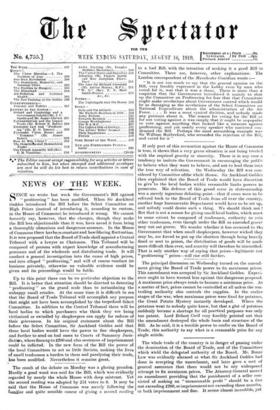The result of the debate on Monday was a glaring
paradox. Hardly a good word was said for the Bill, which was evidently regarded by nearly the whole House with deep mistrust. Yet the second reading was adopted by 251 votes to 8. It may he said that the House of Commons was merely following the familiar and quite sensible course of giving a second reading to a bad Bill, with the intention of making it a good Bill in Committee. There are, however, other explanations. The London correspondent of the Manchester Guardian wrote :- " It is not too much to say that the general opinion on the Bill, very frankly expressed in the Lobby even by men who voted for it, was that it was a sham. There is more than a suspicion that the Government introduced it mainly to shut up the Committee on Profiteering for fear that that Committee might make revelations about Government control which would be as damaging as the revelations of the Select Committee on National Expenditure about the administration of the Air Force. . . . It was a most cynical division, and nobody made any pretence about it. The reason for voting for the Bill or for not voting against it was simply that it might be unpopular to vote against anything that looked like a measure against profiteering, and yet nearly every speaker who mattered con- demned the Bill. Perhaps the most astonishing example was Sir William Rutherford, who seconded the rejection of the Bill, and voted for it."


































